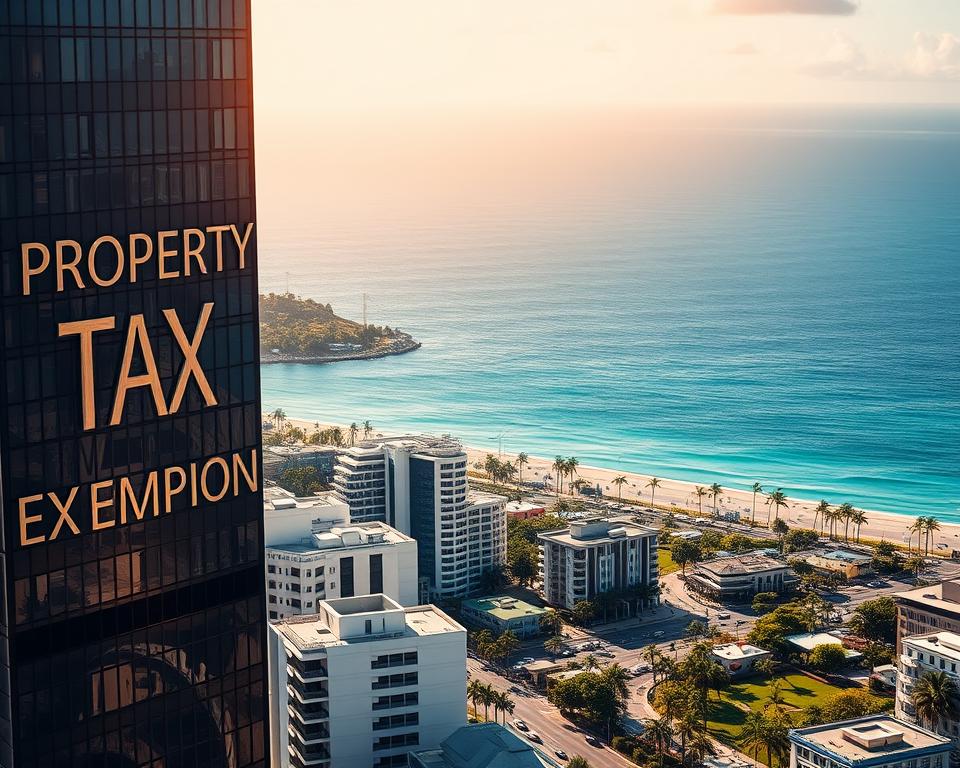As a US citizen, you’re likely no stranger to the complexities of taxation. But what if you could significantly reduce your tax burden without renouncing your citizenship?
Puerto Rico, an unincorporated US territory, offers a unique opportunity for individuals and businesses to save on taxes. Under the Internal Revenue Code §933, income sourced from the island is excluded from US federal tax.
In 2012, Puerto Rico enacted Acts 20 and 22 to attract foreign investment, creating a favorable tax environment. By understanding the interplay between US federal tax laws and Puerto Rico’s local incentives, you can unlock significant savings.
This comprehensive guide will explore how US citizens can legally reduce their tax burden through Puerto Rico’s various incentive programs while maintaining their US citizenship.
Table of Contents:
Puerto Rico’s Unique Tax Status
Puerto Rico’s status as a US territory comes with a unique set of tax implications for its residents. Under the US Internal Revenue Code (IRC), citizens of the United States are generally taxed on all of their income, from whatever sources derived.
Puerto Rico as a US Territory
As a US territory, Puerto Rico is subject to the authority of the US Congress, yet it has its own local government and a degree of autonomy. This unique relationship affects how tax laws are applied to individuals and businesses residing on the island.
The island’s territorial status means that while it is not a state, it is also not considered a foreign country in all contexts for tax purposes. However, specific legislation carves out exceptions that can benefit residents.
The “Foreign Country” Tax Treatment
The Internal Revenue Code treats Puerto Rico as a foreign country for certain tax purposes, creating a unique opportunity for US citizens to legally shield certain income from federal taxation. Section 933 of the IRC specifically allows bona fide residents of Puerto Rico to exclude Puerto Rico-sourced income from their federal tax returns.
- The foreign country treatment means income generated within Puerto Rico can be subject solely to Puerto Rico’s tax laws rather than US federal tax laws.
- Unlike other international tax havens, Puerto Rico’s status doesn’t require US citizens to renounce their citizenship to obtain tax benefits.
- This special treatment creates a legal framework that allows for various tax incentive programs that make Puerto Rico attractive to US mainland residents considering relocation.
Understanding Tax Benefits Puerto Rico Offers
Understanding the tax benefits Puerto Rico offers is crucial for US citizens looking to minimize their tax liability. Puerto Rico has established a unique tax environment that can significantly benefit both businesses and individuals.
Overview of Puerto Rico’s Tax Incentive Programs
Puerto Rico’s tax incentive framework is designed to attract businesses and high-net-worth individuals. The island offers various programs aimed at promoting economic growth. Act 20 and Act 22 were enacted in 2012 to encourage the exportation of services and attract individual investors, respectively.
- Promoting service businesses that export services from Puerto Rico.
- Attracting high-net-worth individuals with exemptions on investment income.
- Encouraging local service providers to expand their businesses.
Evolution from Acts 20 & 22 to Act 60
The tax incentive landscape in Puerto Rico has evolved significantly since 2012. In 2019, Acts 20 and 22 were consolidated into Act 60, also known as the Puerto Rico Tax Incentive Code. This change preserved the benefits of the original acts while introducing new requirements and safeguards.
The evolution to Act 60 reflects Puerto Rico’s commitment to maintaining competitive tax incentives that contribute to the island’s economic development. By streamlining the tax code, Puerto Rico aims to attract more businesses and investors.
Qualifying for Puerto Rico Tax Benefits
Qualifying for Puerto Rico’s tax benefits involves more than just relocating; it demands a genuine connection to the island. To be eligible, individuals must meet specific residency requirements.
Bona Fide Residency Requirements
Establishing bona fide residency in Puerto Rico is crucial for tax benefits. This involves demonstrating a genuine presence on the island and severing ties with other locations.
To achieve this, individuals must pass the 183-day physical presence test, ensuring they spend a significant amount of time on the island.
The 183-Day Physical Presence Test
The 183-day test is a critical component of establishing residency. It requires individuals to be physically present in Puerto Rico for at least 183 days during the taxable year. This test is straightforward, but it’s essential to maintain accurate records of your presence on the island.
Tax Home and Closer Connection Tests
Beyond physical presence, two additional tests must be satisfied: the tax home test and the closer connection test. The tax home test requires that an individual’s main place of business or employment be in Puerto Rico. The closer connection test examines personal and economic ties to determine if connections to Puerto Rico are stronger than those to any other location.
Factors considered include the location of your permanent home, family, personal belongings, banking relationships, and social, political, and religious organizations. As stated by a tax expert,
“The closer connection test is not just about where you live; it’s about where your life is centered.”
Moving your business operations to Puerto Rico can strengthen your case for having your tax home on the island.
- Establishing a tax home in Puerto Rico requires demonstrating that your main place of business or employment is on the island.
- The closer connection test evaluates your personal and economic ties to Puerto Rico compared to other locations.
- Factors such as permanent home, family, and social connections are considered in the closer connection test.
Act 60: Export Services Tax Incentives
Puerto Rico’s Act60 offers a compelling opportunity for businesses engaged in export services to significantly reduce their tax burden. This legislation is designed to attract businesses by providing a favorable tax environment.
Eligible Business Activities
Act60 is applicable to a variety of export services, including creative industries, call centers, and shared services centers. These businesses can benefit from the incentives provided by Act60, enhancing their operational efficiency and profitability.
The eligibility criteria include businesses that provide services outside of Puerto Rico, making it an attractive option for companies looking to expand their global footprint.

The 4% Corporate Tax Rate
One of the key benefits of Act60 is the reduced corporate tax rate of 4%. This significant reduction in the tax rate can lead to substantial savings for businesses, enabling them to reinvest in their operations and growth initiatives.
Property Tax and Dividend Exemptions
Beyond the reduced income tax rate, Act60 provides additional tax exemptions that further enhance the benefits for qualifying businesses. A 100% exemption on property taxes is available for the first five years for certain types of businesses, followed by a 90% exemption thereafter.
Dividends distributed from export service income to shareholders are 100% exempt from Puerto Rico income tax, allowing for tax-efficient profit distribution. These exemptions apply to both real and personal property used in the business, potentially generating significant additional savings.
- A 100% exemption on property taxes for the first five years, followed by a 90% exemption.
- 100% exemption on dividends from export services, enhancing tax efficiency.
- Applicability to both real and personal property used in the business.
The combination of income tax reduction and these additional exemptions creates a comprehensive tax advantage package that substantially reduces the overall tax burden for qualifying businesses.
Individual Investor Tax Benefits
For US citizens, establishing residency in Puerto Rico can unlock substantial tax advantages on investments. This makes it an attractive option for individual investors seeking to optimize their financial strategies.
0% Tax on Interest and Dividends
One of the significant benefits for individual investors in Puerto Rico is the exemption from taxes on interest and dividends. This means that investors can earn income from interest-bearing accounts and dividend-paying stocks without incurring taxes on these earnings. Such a benefit can lead to substantial savings over time, enhancing the overall return on investment.
Capital Gains Tax Exemptions
Puerto Rico also offers favorable treatment for capital gains. Under certain conditions, individual investors may be exempt from paying taxes on long-term capital gains. This exemption can significantly reduce the tax burden on investors who hold assets for extended periods, allowing them to retain more of their investment gains.
Treatment of Pre-Residency Investments
Investments owned before establishing Puerto Rico residency receive special tax treatment. It’s crucial to understand that the appreciation in value that occurred while living outside Puerto Rico remains subject to US federal taxes. However, after becoming a Puerto Rico resident, the tax treatment of future gains can be more favorable. Establishing a clear valuation of assets at the time of residency change is essential for determining the tax implications of future investment decisions. Notably, after 10 years of residency, pre-move appreciation may qualify for a reduced 5% tax rate if the assets are sold before 2036.
By understanding these rules, individual investors can make informed decisions about their investment portfolios and potentially reduce their tax liabilities over the years.
Comparing Puerto Rico vs. US Mainland Taxation
For investors and businesses, comparing the tax regimes of Puerto Rico and the US mainland is essential for making informed decisions. Puerto Rico’s unique tax status as a US territory but with “foreign country” tax treatment for US tax purposes creates a distinct tax environment.
Business Income Tax Comparison
Puerto Rico offers attractive tax incentives for businesses, particularly under Act 60. The 4% corporate tax rate is significantly lower than the US mainland’s corporate tax rate, which can be as high as 21% federally, plus state taxes. This makes Puerto Rico an appealing location for businesses looking to reduce their tax liability.
- Eligible businesses can benefit from a reduced corporate tax rate of 4%.
- Exemptions from property tax and dividend taxes further enhance the attractiveness of Puerto Rico for businesses.

Investment Income Tax Comparison
The investment income tax advantages in Puerto Rico are substantial when compared to US mainland rates. While mainland investors face federal long-term capital gains rates of up to 20% plus the 3.8% Net Investment Income Tax, Puerto Rico residents pay 0% on qualifying investment gains. This includes dividend and interest income that would otherwise be taxed at rates up to 37% on the mainland.
- Residents of Puerto Rico can enjoy 0% tax on qualifying investment gains.
- For an investor with $1 million in annual investment income, the tax savings from relocating to Puerto Rico could exceed $200,000 per year.
- These benefits are particularly attractive to active traders, cryptocurrency investors, and others who generate substantial capital gains.
Obtaining Tax Exemption Decrees
Securing a tax exemption decree is a crucial step for individuals and businesses looking to capitalize on Puerto Rico’s attractive tax incentives. This process involves several key steps and requirements.
Application Process and Requirements
The application process for a tax exemption decree involves submitting the necessary documentation and meeting specific requirements set by the Puerto Rico government. To qualify, applicants must demonstrate their eligibility under the relevant tax incentive programs.
The requirements typically include providing detailed business plans, financial projections, and other supporting documents. It’s essential to ensure that all information is accurate and complete to avoid delays in the approval process.
Decree as a Contract with the Government
Once approved, the exemption decree functions as a binding legal contract between the recipient and the Puerto Rico government. This contractual nature provides important legal protections against future legislative changes that might otherwise affect the promised tax exemption benefits.
The decree typically has a 15-year term for business incentives, providing long-term certainty for business planning and investment decisions. The contract includes specific conditions that must be maintained to preserve the tax benefits, such as minimum employment levels or investment requirements.
For investors, this contractual protection is a significant advantage compared to tax incentives in other jurisdictions that can be more easily modified or eliminated through legislative changes. By understanding the terms and conditions of the decree, individuals and businesses can better navigate the complexities of Puerto Rico’s tax incentive programs and make informed decisions about their property investments.
Conclusion
For US citizens seeking to minimize their tax liability, Puerto Rico offers an attractive solution. The island’s unique tax incentives provide a legal pathway to dramatically reduce tax burdens while maintaining US citizenship and access to the mainland.
The combination of business and investment tax benefits creates a comprehensive package that can be transformative for high-income individuals and business owners. To qualify, individuals must comply with bona fide residency requirements, which demand significant life changes. The contractual nature of tax exemption decrees provides long-term certainty, helping justify relocation costs.
By embracing island living and meeting the requirements, US citizens can capitalize on one of the most powerful tax planning opportunities available today. Puerto Rico’s tax incentives can lead to substantial savings on income, property, and other taxes, making it an appealing destination for investors and businesses alike.

